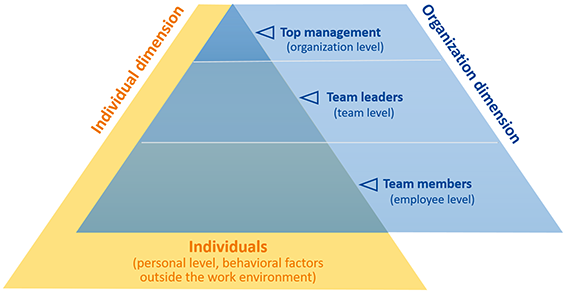
07-08-2023
Hungary
Outsourcing
digitalization, digital transformation, cultural changes, change management, organisation culture, human behavior, leadership, human target groups of change management, individual behaviour
Author: István Gyüre (Process Solutions)
Our article, intended as a topic starter, presents our specific approach. Accordingly, in our upcoming articles, we do not only look at those affected by change management and their tasks through the usual organizational effect and responsibility circles. So, we not only examine the role of the “human as an employee“ (either a leader or a team member), but – significantly expanding the organizational perspective –, we also include the “human as an individual” in the focus of change management challenge analysis.
Thus, in our subsequent analyses, we will examine three human groups in the “organizational dimension” who – depending on their organizational role – can simultaneously be active shapers and target groups of change management: these are top management, team leaders, and team members. (Figure 1)

Figure 1
The fourth human group – which also constitutes the second, “individual dimension” – is formed by “people as individuals”, including all members of the organization, regardless of position. The purpose of distinguishing this group is to allow us to take into account specific behavioral factors related to personal background, which fundamentally influence workplace behavior, for more effective change management. We believe that if every single leader strives more to deeply understand the unique – not just work environment-related – needs and demands of each “team member as an individual”, and to understand their motivations and behaviors arising from these, they will have a greater chance of finding a personalized support solution to effectively help employees resistant to change become active supporters.
Of course, we are aware that a complete understanding of the behavior of the “human as an individual” is impossible, not only due to the obvious protection of private life, but also because of its extraordinary complexity and continuous adaptive development observable in a changing environment. However, it is also true here that it often does not matter where we are, but in which direction we are going! That is, during continuous change management associated with digital transformation, direct managers need to strive to recognize the factors influencing the behavior of their team members and understand their effects in order to have a chance to shape them in a positive direction.
Why is there more need for this than ever before?
Because the human aspect difficulties of change management related to digital transformation are also enhanced by the challenges of managing the hybrid working model – which also became widespread during the Covid-19 pandemic in the financial and accounting services sector. These two revolutionary trends jointly exert an unprecedented strong pressure on the everyday life of companies’ leaders and employees, especially in the following areas. [2]
- Culture and connectedness
- Productivity
- Effectiveness and efficiency
- Balance and autonomy
- Motivation
- Constant change
We draw attention to the last-mentioned area, constant change. Paradoxically, one of the biggest challenges of change management in digital transformation is given by the continuous change itself. The intensive transformation can affect practically every area of a company’s operations, so the introduction of new processes and technological systems and the consolidation of changes often proceed at a fast pace, which continuously means significant pressure for every leader and subordinate employee.
In such a situation, in order to successfully address the human aspect challenges of change management, senior executives need to pay more attention than ever to
- continuous information and involvement of employees with transparent communication, related to this,
- maintaining their motivation and commitment, as well as
- constantly ensuring the balance between work and private life, which is essential
- to establish and apply daily the culture of “supportive leadership”.
With the approach detailed above, sharing our experiences, we launch our blog series analyzing the possible solutions to the human aspect difficulties of change management.
In our upcoming articles, among other things, we will seek answers to questions such as…
- What are the human behavior-shaping factors, the knowledge of which can facilitate the leaders in supporting their team members’ rapid and comprehensive adaptation to changes?
- Which leadership competencies are essential to develop for the most successful implementation of the digital transition?
- Why is it worth making supportive leadership a central element of digital transition management?
- What self-development opportunities do employees have to strengthen their adaptive and resilience capabilities?
References:
[1] www.ps-bpo.com/blog/change-management-and-its-cultural-aspects-in-digitalisation-of-accounting/
(A cikk olvasható magyarul is a PS HU karrieroldalán >>)
Our former Digi-Blog posts about digital transformation:
3 – Change management and its cultural aspects in the digitalisation of accounting
2 – 5 Key goals for digital transformation in professional business services
1 – Digitalization – The engine of economic growth in the 21st century
Browse and read our previous blog posts here.
Follow us on LinkedIn!

